
KARACHI: The National Incubation Center (NIC)’s Karachi chapter will commence operations next month, Chief Executive Officer Ignite, Yusuf Hussain told the media at Karachi’s Mövenpick hotel on Monday.
Stretched over 20,000 square feet, the $6 million project is the fourth startup incubation center funded by Ignite, a Government of Pakistan’s technology fund, which formerly functioned as Information Communications and Technology Research and Development Fund.
Prior to Karachi, Ignite completed NIC Islamabad in February 2017 followed by Lahore in December of the same year. Earlier this year, it launched Peshawar chapter and next month will see the commencement of both Karachi and Quetta incubation centers, according to Hussain.
“About 80% of the world’s gross domestic product (GDP) used to be in Asia, but in the next 100 years, Europe took over because they came up with innovation,” the Ignite chief said drawing the audience attention towards the importance of innovation for economic growth.
Pressing on his point further, Hussain said the world’s five largest companies are startups, companies that come up with innovative ideas and business models that didn’t exist before. In the last 30 years, innovation came from startups, he said referring to these companies as a major source of economic growth and employment not only in the U.S. but also in China and India.
“In the same way, startups are important for Pakistan, which is why we are doing it,” the Ignite chief said, unveiling details of the government’s plan about a network of state-funded incubation centres across Pakistan. These incubators will expedite the process of innovation, which will drive economic growth.
Strategically located in one of the country’s top engineering and technology hubs, NED University, the NIC Karachi will mentor more than 40 companies every year and connect them with investors. Over the next five years, NIC Karachi plans to help 200 promising startups to create high growth and sustainable businesses.
It will run various programs ranging from short boot camps to year-long acceleration programs and focus on thirteen areas that include but are not limited to fintech, real estate, commerce, cyber-security, and robotics. The incubatees at NIC Karachi will have access to a design studio, NED University’s Makers’ Lab and a Fintech center.
The project is being executed by LMKT, a technology solutions company, with partners including NED University, Habib Bank Limited, Pakistan Telecommunication Company Limited, Pakistan Poverty Alleviation Fund, Founder Institute and i2i (Invest2Innovate).
With a presence in each of the four provinces and in the federal capital, the Ministry of IT and Telecom’s NIC project will be a welcome addition to Pakistan’s startup ecosystem, which has yet to produce a billion dollar company.
The government of Punjab-owned technology incubation center Plan 9 has been around for years while Nest i/o of Pakistan Software Houses Association (P@sha) for IT and IT-enabled services has also passed out a few batches, but nothing significant has come out of these incubators thus far.
Hussain acknowledges that over 90% of startups fail globally and many incubators become ineffective but adds they have done a study on the mistakes that led to the failure of those incubators and have come prepared. “The success rate of startups from incubators is higher than those that launch and operate on their own,” he says.
It is perhaps why, NIC Karachi has set up highly competitive criteria for potential incubatees. Unlike Peshawar and Quetta, the criteria for Karachi, Lahore, and Islamabad is tough to meet, Hussain says giving an example of Lahore where only 15 startups were accepted out of 700 applications.
In case of Karachi, they plan to select companies that have demonstrated some success and are at a certain stage of growth and need help to scale up. So in that sense, NIC Karachi will also act as an accelerator for them.
Those selected will have access to experts from their relevant sectors who would provide mentorship and exposure to investors, two of the main issues facing startups.
Funding is a huge problem, Hussain says. In India startups receive $7 billion in annual funding compared to a paltry $70 million in Pakistan, which is not even one-tenth of the former, he said.
India moved into tech much earlier and attracted foreign investors while Pakistan lagged behind because of its fight against terrorism. But now, the country is well positioned to grow, the Ignite chief said, adding, “Now we want Pakistan to produce Googles, Apples, and Amazons of the world.”







[…] $6 million National Incubation Center Karachi to commence operation in May Profit by Pakistan Today […]
Comments are closed.